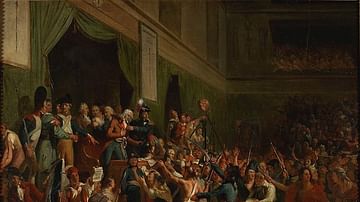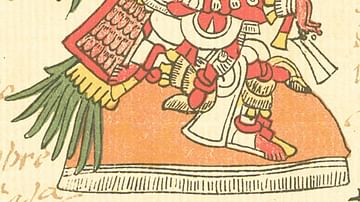Search
Search Results

Definition
Parthian Religion
Parthian religion might be best described with two words: inclusive and evolving. As Parthia's empire held within it a variety of cultures, the Parthians wisely left each to their own beliefs and traditions, like the Seleucid Empire and the...

Definition
Prairial Uprising
The Uprising of 1 Prairial Year III (20 May 1795) was the last major popular insurrection during the French Revolution (1789-1799). It was the final time that the sans-culottes played an important role in French politics until the revolutions...

Definition
Tlahuizcalpantecuhtli
Tlahuizcalpantecuhtli, 'Dawn Lord,' was a Mesoamerican god who represented a menacing aspect of Venus, the morning star, and was one of the four gods which held up the sky. The people of the ancient Americas believed his rays could damage...

Definition
Matariki
The Maori people of Aotearoa (New Zealand) have long observed the heliacal (pre-dawn) rising of the star cluster commonly known throughout the world as Pleiades or Messier 45 (M45), located in the constellation of Taurus. Matariki is the...

Image
Aztec Sun Stone
The Aztec Sun Stone (also known as the Calendar Stone) is a representation of the five eras of the sun from Aztec mythology. The stone was part of the architectural complex of the Temple Mayor of Tenochtitlán and dates to c. 1427 CE. The...

Image
Floréal
Depiction of Floréal, the eighth month of the French Republican Calendar, the "month of flowers", by Salvatore Tresca and Louis Lafitte, 1797-1798.

Image
Fabre d'Eglantine
Portrait of Fabre d'Eglantine (1750-1794), the French poet, playwright, and Jacobin politician who is best known for having come up with the names of the months in the French Republican calendar. Oil on canvas by an unknown artist, c. 1790-94...

Image
Messidor
Representation of the month of Messidor, the tenth month in the French Republican Calendar meaning "month of harvest", by Louis Lafitte.
National Library & Bureau of Measures.

Article
Egyptian Gods - The Complete List
The gods and goddesses of Ancient Egypt were an integral part of the people's everyday lives for over 3,000 years. There were over 2,000 deities in the Egyptian pantheon, many whose names are well known - Isis, Osiris, Horus, Amun, Ra, Hathor...

Article
Caesar As Dictator: His Impact on the City of Rome
Gaius Julius Caesar (100-44 BCE) first assumed the role of dictator in 49 BCE, however, once he had secured his election as consul for the following year, he resigned after 11 days. After defeating Pompey at the Battle of Pharsalus in 48...